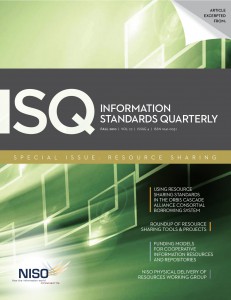- These list items are microformat entries and are hidden from view.
- https://dltj.org/article/isq-fall-2010/
- I'm pleased to announce that the Fall 2010 issue of NISO's International Standards Quarterly (ISQ) is done and available online to NISO members and ISQ subscribers. Print copies are scheduled to be mailed on December 28th. The individual issue is available for purchase (see the form link to on the issue homepage), and some of the articles are freely available on the NISO website. The theme for the issue is resource sharing, and I was privileged to be the guest editor for the issue. Included below is my introduction letter to whet your appetite for the full issue.
- 2010-12-15T16:57:47+00:00
- 2018-01-15T20:28:01+00:00
“Do More … With Someone Else” – Guest Editor Introduction to NISO ISQ Fall Issue
I'm pleased to announce that the Fall 2010 issue of NISO's International Standards Quarterly (ISQ) is done and available online to NISO members and ISQ subscribers. Print copies are scheduled to be mailed on December 28th. The individual issue is available for purchase (see the form link to on the issue homepage), and some of the articles are freely available on the NISO website. The theme for the issue is resource sharing, and I was privileged to be the guest editor for the issue. Included below is my introduction letter to whet your appetite for the full issue.

Issue Introduction: "Do More ... With Someone Else"
It comes as no surprise in today's economic conditions that the mantra of “do more with less” is often repeated. For libraries, there simply isn’t enough money to buy and hold everything that patrons might want. Although that has been true for a long time, as has the professional ethic to share the information resources we have to the greatest extent possible, pressures are increasing to find new partnerships and new workflows that improve service to patrons and reduce the costs of doing so.
This issue contains articles that illustrate new approaches and improvements to resource sharing. One feature article is an exploration by Kyle Banerjee and Anya Arnold of the standards and protocols used by the Orbis Cascade Alliance Consortial Borrowing System. The first consortium to use the WorldCat Navigator software, the Alliance is at the forefront of pushing interoperability between various systems. Their experience points to practical issues when standards such as Z39.50 and NCIP are used to connect multi-party, multi-system environments. A second feature contains a compilation of some of the new tools, systems, and standards that are available for resource sharing. One or more might be right for you.
As important as standards are in making the data bits flow smoothly from place-to-place, the ways in which projects are financed and sustained are key to enabling those bits to keep flowing. In the opinion section of this issue are two articles that address funding models for cooperative information resources and repositories. First, Edward Zalta and Uri Nodelman, Principal Editor and Senior Editor of the Stanford Encyclopedia of Philosophy (SEP), review the successes and the challenges of their effort to endow a fund for the maintenance and expansion of an open access encyclopedia. SEP started by soliciting commitments first from libraries and private donors, then from individuals. Now they are striving to find new “carrots” for contributors to make up the difference in the hopes of avoiding “sticks” that may result in closed access. In the second article, Oya Rieger and Simeon Warner discuss the early stages of finding a sustainable business model for the arXiv service. Up to this point it has been supported by the generosity of the host institution. Twenty years after it was founded and ten years after it moved from Los Alamos National Laboratory to Cornell University, an international advisory group is now working on a business plan for the long-term sustainability of arXiv.
The member spotlight is an interview with Susan Campbell of the College Center for Library Automation (CCLA) in Florida. CCLA is making use of standards such as COUNTER/SUSHI, NCIP, and Open URL to support their consortium members.
Much of the focus today seems to be on electronic resources, but a substantial volume of physical materials are still being shared and finding cost-effective ways of doing this are more important than ever. In the NISO Reports section Valerie Horton and Diana Sachs-Silveira, co-chairs of the Physical Delivery of Library Resources working group, provide an update on their work to create a recommended practice for optimizing the sharing of items between libraries.
In times of “do more with less” perhaps the phrase we should take to heart is “do more with someone else.” By combining efforts we can be greater than the sum of our parts. We need to stretch, enhance, and redefine the standards and processes used today to meet this new, critical mission. I hope this issue of ISQ helps you find ways to do just that.
Originally published as: Murray, Peter E. (2010). Do More ... With Someone Else International Standards Quarterly, 22 (4), 3-3 : 10.3789/isqv22n4.2010.01